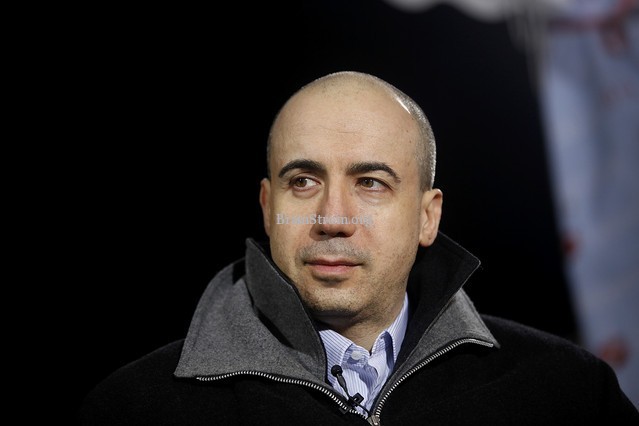Physicists are rarely wealthy or famous, but a new prize rewarding research at the field’s cutting edges has made nine of them instant multimillionaires.

Simon Dawson/Bloomberg News
Yuri Milner
The nine are recipients of the Fundamental Physics Prize, established by Yuri Milner, a Russian physics student who dropped out of graduate school in 1989 and later earned billions investing in Internet companies like Facebook and Groupon.
“It knocked me off my feet,” said Alan H. Guth, a professor of physics at the Massachusetts Institute of Technology who was among the winners. He came up with the idea of cosmic inflation, that there was a period of extremely rapid expansion in the first instant of the universe.
When he was told of the $3 million prize, he assumed that the money would be shared among the winners. Not so: Instead, each of this year’s nine recipients will receive $3 million, the most lucrative academic prize in the world. TheNobel Prize currently comes with an award of $1.2 million, usually split by two or three people. The Templeton Prize, which honors contributions to understanding spiritual dimensions of life, has been the largest monetary award given to an individual, $1.7 million this year.
The $3 million has already appeared in Dr. Guth’s bank account, one that had had a balance of $200. “Suddenly, it said, $3,000,200,” he said. “The bank charged a $12 wire transfer fee, but that was easily affordable.”
Mr. Milner said that he wanted to recognize advances in delving into the deepest mysteries of physics and the universe. “This intellectual quest to understand the universe really defines us as human beings,” he said.
Four of the physicists work at the Institute for Advanced Study in Princeton, N.J.: Nima Arkani-Hamed, Juan Maldacena, Nathan Seiberg and Edward Witten. They work on theories trying to tie together the basic particles and forces of the universe, particularly with a mathematical machinery known as string theory.
The other winners are Andrei Linde, a physicist at Stanford who also worked on cosmic inflation; Alexei Kitaev, a professor of physics at the California Institute of Technology who works on quantum computers; Maxim Kontsevich, a mathematician at the Institute of Advanced Scientific Studies outside Paris whose abstract mathematical findings proved useful to physicists unraveling string theory; and Ashoke Sen, a string theorist at Harish-Chandra Research Institute in India.
Mr. Milner personally selected the inaugural group, but future recipients of the Fundamental Physics Prize, to be awarded annually, will be decided by previous winners.
He declined to explain in detail how he selected which accomplishments to honor or why all of the winners are men. “I truly see this as a start,” Mr. Milner said. “Going forward, it’s going to be up to the committee to make those considerations.”
According to the rules, the prize in future years may be split among multiple winners, and a researcher will be able to win more than once. Mr. Milner also announced that there would be a $100,000 prize to honor promising young researchers.
Unlike the Nobel in physics, the Fundamental Physics Prize can be awarded to scientists whose ideas have not yet been verified by experiments, which often occurs decades later. Sometimes a radical new idea “really deserves recognition right away because it expands our understanding of at least what is possible,” Mr. Milner said.
Dr. Arkani-Hamed, for example, has worked on theories about the origin of the Higgs boson, the particle thought to have been discovered recently at the Large Hadron Colliderin Switzerland, and about how that collider could discover new dimensions. None of his theories have been proved yet. He said several were “under strain” because of the new data.
Several of the winners said they hoped that the new prize, with its large cash award, would help raise recognition of physics and draw more students into the field. “It’ll be great to have this sort of showcase for what’s going on in the subject every year,” Dr. Arkani-Hamed said.
The winners said they had not yet decided what to do with their windfall.
“There are some rather mundane things, like paying out the mortgage,” said Mr. Kitaev, who added that he was thinking about putting some of the money into education efforts.
“My success is in large part due to good education, my teachers and the atmosphere of excitement in science when I grew up,” he said. “I might try to help restore this atmosphere as much as I can.”
Dr. Guth agreed. “I do think prizes like this help put across to the public that fundamental physics is important, and it’s not just heavyweight boxing that’s worthy of prizes,” he said.
But he was going to warn his students not to get the wrong idea. “Certainly, it’s still not a great idea to go into physics for the money,” he said.
This article has been revised to reflect the following correction:
Correction: August 1, 2012
An article on Tuesday about the new Fundamental Physics Prize misattributed a quotation by a winner about how he would spend the $3 million in prize money. It was Alexei Kitaev, a professor of physics at the California Institute of Technology — not Maxim Kontsevich, a mathematician at the Institute of Advanced Scientific Studies outside Paris who is among the eight other prizewinners — who said, in part, “There are some rather mundane things, like paying out the mortgage.” The article also gave an outdated amount for the monetary award to winners of the Nobel Prize. The prize was reduced this year to about $1.2 million, from about $1.5 million.
A version of this article appeared in print on July 31, 2012, on page A7 of the New York edition with the headline: 9 Scientists Receive a New Physics Prize.
Thanks for installing the Bottom of every post plugin by Corey Salzano. Contact me if you need custom WordPress plugins or website design.

